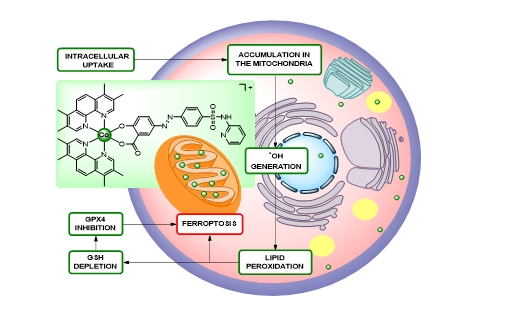
Abstract
Despite significant improvements in the treatment of cancerous tumors in the last decades, cancer remains one of the deadliest diseases worldwide. To overcome the shortcomings of currently applied chemotherapeutic treatments, much research efforts have been devoted towards the development of ferroptosis inducing anticancer agents. Ferroptosis is a newly described form of regulated, non-apoptotic cell death that is associated with high potential inside the clinics. Herein, the chemical synthesis and biological evaluation of a Co(III) polypyridine sulfasalazine complex as a ferroptosis inducer is reported. Upon entering the cancerous cells, the metal complex primarily accumulated in the mitochondria, triggering the production of hydroxy radicals and lipid peroxides, ultimately causing cell death by ferroptosis. The compound demonstrated to eradicate various monolayer cancer cells as well as colon carcinoma multicellular tumor spheroids. To the best of our knowledge this study reports on the first example of a Co(III) complex that is capable of inducing ferroptosis.[1] To further enhance the therapeutic potential of the metal complex, the compound was encapsulated into polymeric nanoparticles. The nanomaterial was found to eradicate various monolayer cancer cells as well as colon carcinoma multicellular tumor spheroids at low concentrations.
